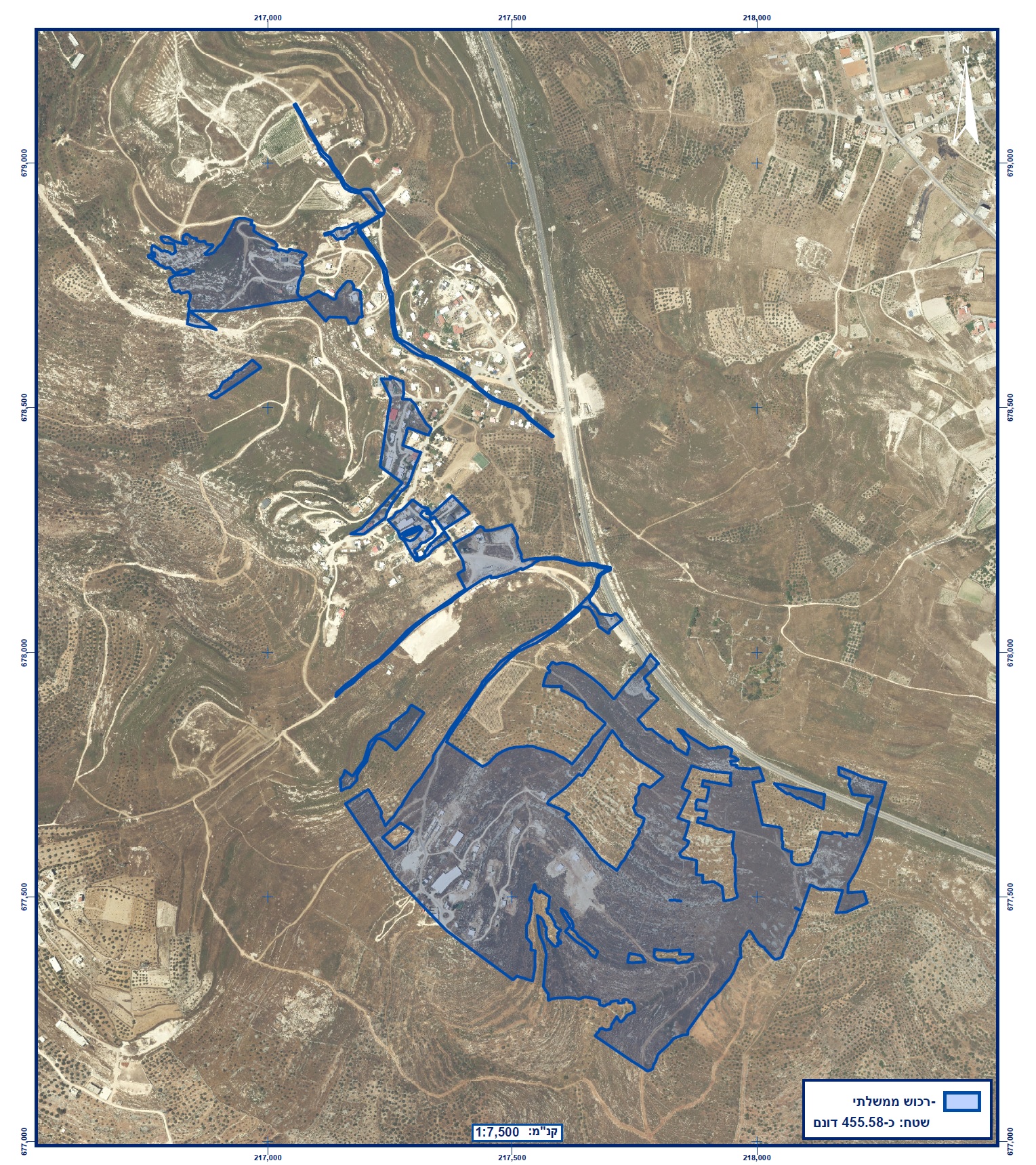Yesterday, the Custodian of Government Property in the Civil Administration declared 455.58 dunams (113 acres) of land belonging to the villages of Tell, Jit, and Far’ata, west of Nablus, as “state land,” for the purpose of legalizing the illegal outpost of Havat Gilad. Most of the declared land is located about one kilometer south of the existing houses in the outpost. This means that it is not a “legalization” of the outpost but rather preparation for establishing another settlement south of it.
Since the current government was formed in December 2022, around 25,959 dunams have been declared state land — amounting to nearly half of all land ever declared state land since the Oslo Accords. Declaring land as state land is one of the main tools Israel uses to take control of land in the occupied territories. Land declared as state land is allocated almost exclusively to Israelis.
During the 1980s, Israel declared hundreds of thousands of dunams as state land. In 1992, the Rabin government decided to halt such declarations, but the Netanyahu government resumed the practice in 1998. Over the past two years, there has been a sharp increase in the amount of land declared as state land, and the government plans to issue more declarations to enable the establishment of new settlements as approved by the cabinet.
Peace Now: “It is not a “legalization” of an outpost but rather the establishment of a new settlement one kilometer away of it. Netanyahu and Smotrich are determined to fight against the whole world and against the interests of Israeli citizens in favor of a handful of settlers who receive thousands of dunams as a gift — as if there is no political conflict to resolve or war to end. Today, it is clear to everyone that this conflict cannot be resolved without a political agreement that includes the establishment of a Palestinian state in the West Bank and Gaza, yet the Israeli government chooses instead to make peace more difficult and push us further away from ending the bloodshed”.

The lands declared as “State Land” in blue. Most of the houses of the outpost are located on private land and not on the declared lands.
The Declaration: Not “Legalization” but a New Settlement
The outpost of Havat Gilad, established in 2002 on private land, was evacuated several times by the army in its early years, but later became a permanent fact on the ground. Today dozens of families live in the outpost. On February 4, 2018, following the murder of Rabbi Raziel Shevach near the outpost, the Netanyahu government decided to legalize the outpost.
In the years since, settlers attempted to claim they had purchased the land from Palestinian owners, but they failed to prove ownership, and therefore the outpost was not legalized. Now, after staff work carried out by the Settlement Administration established by the government under Minister Smotrich, the state has declared land about one kilometer south of the outpost as “state land” for the purpose of “legalizing” it. However, the declared lands show that the vast majority of the outpost’s houses are built on private land and therefore cannot be legalized. To make the outpost “legal” according to Israel’s own rules (all settlements are illegal under international law), the existing houses would have to be demolished and the outpost rebuilt elsewhere, about a kilometer away from its current location.
It is already clear, however, that in practice no buildings will be demolished; instead, new construction will simply be added on the declared land. For decades the government has allowed the outpost to continue to seize private land and has refrained from removing the settlers. It is hard to believe that now, as it promotes formal “regularization,” it will suddenly demolish homes.
This is exactly what happened in the case of the Nativ Ha’avot outpost, which was built on private land west of Bethlehem. The landowners petitioned the High Court of Justice, and the state committed before the Court that it would conduct a land survey after which the houses that will be found built on private land would be removed. In practice, after the survey and the declaration on state land, the government refused to remove those houses, and only after another High Court petition and a long political struggle were the structures finally evacuated. The settlers, however, received personal compensation and a construction plan for hundreds of housing units on the lands added to the outpost.
Download the list of declarations by Peace Now, 23/12/24.
Download the list of declarations at the Civil Administrations reply to Peace Now's Freedom of Information request, December 2016.

